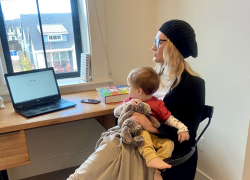 For me, becoming a mother was full of joy and wonder. But, as any parent can attest, it can also be challenging and exhausting. Returning to work is not the least of the challenges. The return to work is a key moment when you are forced to reconcile who you once were with who you are now – a working mom. And for breastfeeding parents, that means a daily grind of hauling pumping equipment, washing pump parts and managing a pumping schedule to continue to nurse your baby.
For me, becoming a mother was full of joy and wonder. But, as any parent can attest, it can also be challenging and exhausting. Returning to work is not the least of the challenges. The return to work is a key moment when you are forced to reconcile who you once were with who you are now – a working mom. And for breastfeeding parents, that means a daily grind of hauling pumping equipment, washing pump parts and managing a pumping schedule to continue to nurse your baby.
My son was born last year, and I have been pumping at work since I returned from leave last November. I am grateful that I do not have to worry about having time and space at work to pump breastmilk on top of managing all of the other changes in our family life. Thanks to the Providing Urgent Maternal Protections Act (“PUMP” Act), which President Biden signed into law at the end of 2022, some 9 million additional women won’t have to add this worry to their list either.
The decision to breastfeed is a deeply personal choice, and it is a choice that all parents should be able to make without worrying that their workplace will not accommodate their need to pump. Not being able to pump over the course of several hours – let alone several shifts – can have significant impacts on a worker’s comfort and their ability to express breastmilk, maintain their breastmilk supply and provide nutrition for their child. These are common challenges that nursing parents face, and the law now recognizes the need for workplace protections for many more women.
The Wage and Hour Division (WHD) at the U.S. Department of Labor has been hard at work to implement the expansion of the right to break time and private space to express breast milk at work to many more working parents.
New guidance on the PUMP Act
In January 2023, we updated our fact sheet, “FLSA Protections for Employees to Pump Breast Milk at Work,” and published Frequently Asked Questions (FAQs) to provide accessible information. Shortly afterwards, we released the PUMP Act Field Assistance Bulletin, which provides guidance to the public and WHD field staff regarding enforcement of the pump at work provisions of the FLSA, and held a nationwide webinar.
The #PowerToPump Initiative
On Aug. 1, 2023, we marked the start of World Breastfeeding Week and National Breastfeeding Month with a nationwide Day of Action to launch our #PowerToPump initiative, which focuses on educating workers, employers and stakeholders on workers’ expanded rights to pump at work under the PUMP Act. On this Day of Action, our 54 district offices and the national office distributed PUMP Act materials to over 300 community-based organizations and nonprofits across the country, including WIC offices, worker centers, breastfeeding coalitions and health clinics. We continue to partner with these organizations to provide presentations, resources and information about workers’ rights under the law. We released door hangers for workers to hang outside of their designated pumping space at work and workers' rights cards.
We are also working to ensure that employers have the information they need to make these rights a reality for working moms. We know that even one day without the ability to pump at work can make a pumping mom sick or experience a decrease in milk supply, so our families need employers to get this right from the moment working moms return to work.
As part of the #PowerToPump initiative, we provided industry-specific webinars and FAQ guidance to five key industries impacted by the expanded protections: agriculture, retail and restaurant, care, transportation, and education.
New materials for Mother’s Day
In recognition of Mother’s Day, we’ve revamped our Maternal Health webpage to better help the public understand the range of federal protections for workers during pregnancy and after childbirth.
In addition, we released new Frequently Asked Questions about PUMP Act protections, based on real questions from stakeholders and webinar attendees.
Since the PUMP Act’s implementation, our field staff have conducted nearly 900 outreach events about the pump at work provisions of the FLSA. We will continue to incorporate feedback from workers, advocates and employers to ensure our guidance is as helpful as possible and that all employers have the tools to comply with the law and support working parents.
This Mother’s Day, we celebrate the impact of the PUMP Act and honor working parents across the country for all that they do.
Kristin M. García is the deputy administrator for the Department of Labor's Wage and Hour Division. Follow the division on LinkedIn and on Twitter at @WHD_DOL.

 U.S. Department of Labor Blog
U.S. Department of Labor Blog




